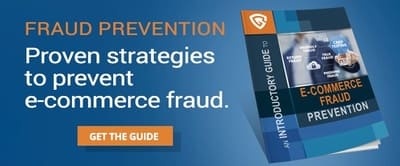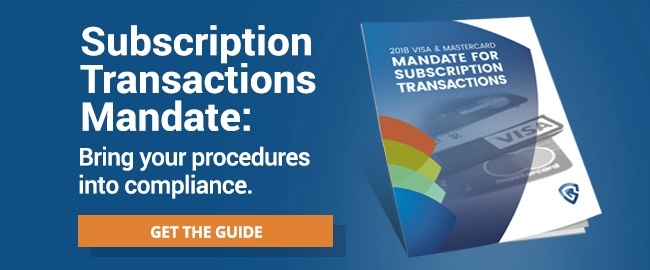8 Tips to Manage Subscriptions and Recurring Billing
Recurring billing and subscriptions are an excellent way to see consistent revenue in your business.
They offer an easy way for your customers to receive a product or service, and keeps revenue rolling in for your business, month by month.
Securely managing recurring billing and subscriptions can be a major challenge, however. They’re one of the most frequent causes of transaction disputes with customers, and they can lead to substantial problems in your business processing.
Fortunately, a number of tools and precautions are available to reduce the number of chargebacks you’ll be forced to process. It all begins with your first recurring transaction.
First Recurring Transaction
 When processing your first recurring transaction, you’ll start with initial set-up, which should be processed the same way as any other telephone or Internet transaction. Begin by submitting the proper queries with the correct authorization to use the card, and verify that the cardholder’s identity matches the account to be processed.
When processing your first recurring transaction, you’ll start with initial set-up, which should be processed the same way as any other telephone or Internet transaction. Begin by submitting the proper queries with the correct authorization to use the card, and verify that the cardholder’s identity matches the account to be processed.
From there, you’ll want to specify that this first piece of business is the beginning of a series of recurring transactions. Your sales receipt will need to include the phrase “recurring transaction,” and it should also specify the timeframe and frequency of charges from a certain account.
The merchant should keep this information on file for reference in handling any charges or transactions that may come under dispute in the future.
A majority of customers will choose to discontinue after the first recurring transaction, but for the ones who choose to continue the subscription, you’ll want to weigh these suggestions to manage subscriptions and the billing process without losing revenue from chargebacks.
1. Securely Store Essential Information
When you launch a system of recurring billing, you’ll quickly amass sensitive customer data you have to keep on file. All information on file should be securely stored and kept up to date. Some of the worst hacking events in recent commercial history stemmed from improperly stored information.
If you don’t have an in-house electronic information processing service that stores information securely and accurately, you might want to investigate third-party services, such as Visa Account Updater (VAU), which is a service that securely processes account information and alerts the system about any necessary updates to cardholder information.
2. Use Secure Encryption for Transactions
Since you’ll be processing regular transactions over your website, the system you use should always be encrypted for your transactions. Don’t try to go cheap on this particular process. It’s vital to invest time, money, and effort to keep your payment system as secure as possible.
Unsecure payment methods can result in a chargeback nightmare if personal account information gets released onto the web as free game for hackers and identity theft.
3. Look Into Subscription-Billing Software
A great way to ensure the security of both payments and sensitive personal information is to use subscription-billing software. The best kinds of software will provide proper encryption and information storage, as well as accurate histories, email receipts, and communications management.
These will, of course, attach a fee for their services, but it’s a small price to pay if it will help you reduce fraudulent charges, chargebacks, and lost customers.
4. Write Transparent Policies
All companies that sell goods or services must have strong transaction policies in place in order to keep things running smoothly and avoid fraudulent activity. When it comes to reducing the number of chargebacks associated with recurring payments, it’s even more important to have transparent policies.
Make sure your customers are well aware of your cancellation policy and any fees that come with it. You’ll still have customers calling to dispute their recurring subscription charges, but you’re more apt to avoid a large number of those entanglements if your customers are well aware of your policies in advance.
5. Communicate with Customers
 Customer communication during recurring transactions is one of the most important components of a subscription business. All recurring transactions should be properly labeled as such so that customers recognize them on a bank statement.
Customer communication during recurring transactions is one of the most important components of a subscription business. All recurring transactions should be properly labeled as such so that customers recognize them on a bank statement.
Also, it’s integral that you notify your customers before you bill their account. Trying to trick customers into continuing a subscription service by letting them “forget to cancel” will only result in more of a headache for you.
Best practices to manage subscriptions and recurring billing mandate that you notify customers 10 days in advance of all recurring transactions. It’s also extremely important to notify customers in advance if there is any change in the authorization of their current payment method or an adjustment to the amount billed.
6. Listen to Customers
Continue to interact with your customers throughout the subscription period. Ask for feedback via email and phone surveys, social media, and any other methods you favor. As you read over the comments, watch specifically for customer complaints, particularly those that pertain to problems with transactions or communication snafus.
These will help you identify problems in your system and follow up with the customer before he or she has cause to file for a chargeback.
7. Only Use Cardholder Information for Its Intended Purpose
Be careful with the cardholder information you gather. It should only be used for its intended purpose (in other words, processing recurring transactions), and nothing else. This information should not, for example, be used to verify age or determine any other personal information about the customer.
Likewise, treat the information you keep on file with care. CVV2 data, for example, may not be kept on file under any circumstances. Violation of any of these rules is strictly prohibited, and could result in lawsuits and other legal problems.
Thanks for following the Chargeback Gurus blog. Feel free to submit topic suggestions, questions or requests for advice to: win@chargebackgurus.com






